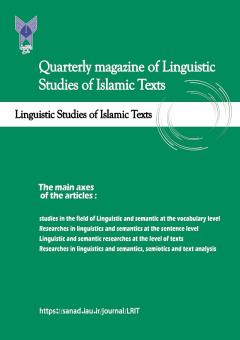Semantic analysis of "soul" in the Holy Quran and its comparison with the concept of "psyche"
Subject Areas :
1 -
Keywords: soul, psyche, soul, semantics, conceptualization,
Abstract :
Self is one of the most frequent and central words in the Qur'an, on which the understanding of many verses of the Qur'an and issues of anthropology is based. The soul had various meanings before Islam, and after the revelation of the Qur'an, the meaning of many derivatives of the soul and the soul itself underwent changes. After the separation of the field of psychology from philosophy and closer to experimental sciences, the word "Psyche" in Persian meaning "psyche" moved away from the meaning of "soul" and came closer to the meaning of "mind". Despite all this, the mind considered by psychologists has been reduced to a hypothetical and materialistic concept, while the mind mentioned in the verses of the Qur'an is considered to be merely a faculty of the hierarchy of the faculties of the soul. Also, based on the summation of all the verses, it can be argued that "soul" is also different from "spirit" because it is not possible to attach an immaterial thing to a material thing, and some verses have also mentioned the soul as the last creation. In distinguishing "soul" as an existential truth that is considered as the dimension of reason in man, with the soul, which is considered to be the essence of life in man, "soul" should be considered as distinct from the rank of "soul" from the point of view of concept and existential truth. At the same time, there is no doubt about the consistency of both of them. But in terms of comparing the concept of the soul with the concept of the psyche in the science of psychology, we can only consider both concepts common to the concept of "mind", which of course is considered a level of the powers of the soul according to the Qur'an, but its place in the science of psychology is still It is ambiguous and based on empirical bases, it cannot be imagined as a true existence, and empiricists reduce the mind to only a kind of feeling in the individual, which is the result of the physico-chemical interactions of the brain, and for this reason, these two concepts should not be completely synonymous. and found it appropriate.
القرآن الکریم
ابن سیده، علی بن اسماعیل، (1421ق). المحکم المحیط الاعظم(چ1)، بیروت: دارالکتب العلمیه.
ابن فارس، أحمدبن فارس(1404). معجم مقاییس اللغه. قم، مکتب الأعلام الإسلامی.
ابنمنظور، محمدبن مکرم(1414ق). لسان العرب. چ3، بیروت، دار صادر.
ازهری، محمدبن احمد، (1421ق). تهذیب اللغه، ج 11و13و15(چ1)، بیروت: دار إحیاء التراث العربی.
اسماعیل صینی، محمود(1414ق). المکنز العربی المعاصر(چ1)، بیروت: مکتبه لبنان للناشرون.
آلاتور، آنتونی(1384). درآمدی بر زبان معناشناسی تاریخی. ترجمة یحیی مدرّسی. تهران: پژوهشگاه علوم انسانی و مطالعات فرهنگی.
بورینگ، ادوین. جی. (1374). تاریخ علم روان شناسی. ترجمة سعید شاملو، تهران: رشد.
پالمر، فرانک(1373). نگاهی تازه به معناشناسی. ترجمة کورش صفوی. تهران: مرکز.
جوهری، اسماعیل بن حماد(1376ق)، ج2،3،5، الصحاح(چ1). بیروت: دارالعلم للملایین.
خاکپور، حسین؛ بلوردی، مریم، معناشناسی درزمانی واژگان قرآن در تفسیر المیزان، دوره 6، شماره 21، شهریور 1394، ص67-43.
دکارت، رنه، ترجمه: صانعی دره بیدی، منوچهر، فلسفه دکارت، (1376). تهران(چ1): انتشارات بینالمللی الهدی.
دهخدا، علیاکبر(1385). لغتنامة دهخدا. تهران: دانشگاه تهران.
رازی، فخرالدین محمد بن عمر الخطیب(1420ق)، تفسیر کبیر، بیروت: دارالاحیاء التراث العربی.
راغب اصفهانی، حسین بن محمد(1374ش). مفردات الفاظ القرآن، ج4(چ2)، تهران: دارالقلم.
راغب اصفهانی، حسینبن محمّد(1412ق). مفردات الفاظ قرآن. بیروت: دارالعلم.
زبیدی، محمد بن محمد(1414ق). ج9، تاج العروس(چ1)، بیروت:دارالفکر.
زرسازان، عاطفه، معناشناسی نفس در قرآن کریم با تأکید برروابط همنشینی و جانشینی، دو فصلنامة علمی-پژوهشی پژوهشهای زیبانشناختی قرآن، سال هفتم، شماره دوم، شماره پیاپی (14)؛ پاییز و زمستان 1397.
سعیدی روشن، محمّدباقر(1385). تحلیل زبان قرآن و روششناسی فهم آن. قم: مؤسّسة پژوهشی حوزه و دانشگاه.
شریعتمداری، علی، (1370). مقدمه روان شناسی، تهران: صفار، چاپ سیزدهم.
صاحب، اسماعیل بن عماد(1414ق)، المحیط فی اللغه(چ1)، بیروت: عالم الکتب.
صدر، سیدمحمدباقر، بحوث فی علم الاصول، تقریر سیدمحمود هاشمی شاهرودی، قم: مؤسسه دائره المعارف، فقه اسلامی بر مذهب اهل بیت(علیهم السلام)، 1417ق، ب.
صفوی، کوروش(1387). درآمدی بر معنیشناسی. تهران: انتشارات سورة مهر.
طباطبایی، محمدحسین،(1372ش). المیزان فی تفسیر القرآن، دارالکتب الاسلامیة، تهران، چاپ پنجم.
طریحی، فخرالدین(1375ش). مجمع البحرین. چ3، تهران، مرتضوی.
طیب، سیدعبدالحسین(1369ش)، اطیب البیان فی تفسیر القرآن، تهران: انتشارات اسلام.
عبدالباقی، محمد فؤاد،(1378ش). المعجم المفهرس لألفاظ القرآن الکریم، تهران: انتشارات اسلام.
فراهیدی، خلیل بن احمد(1409ق). کتاب العین(چ2)، ج4و6و7، تهران: نشر هجرت.
فضیلت، محمود(1385). معناشناسی و معانی در زبان و ادبیّات. کرمانشاه: انتشارات دانشگاه رازی.
ابن درید، محمدبن حسن(1988م). جمهره اللغه، ج1و2(چ1)، بیروت: دارالعلم للملایین.
فیّومی، أحمد بن محمد(1414ق). المصباح المنیر فی غریب الشرح الکبیر للرافعی، چ2، قم، مؤسسه دارالهجره.
کدیور، پروین، روانشناسی یادگیری(1386ش). تهران: سازمان مطالعه و تدوین کتب علوم انسانی دانشگاهها(سمت).
مختارعمر، احمد(1386). معناشناسی. ترجمة حسین سیّدی. مشهد: انتشارات دانشگاه فردوسی مشهد.
مصطفوی، حسن(1430ق). التحقیق فی کلمات القرآن الکریم. چ3، بیروت، دارالکتب الاسلامیه. مرکز للنشر الآثار العلامه المصطفوی.
Lakoff & Johnson, M. (1980) Metaphors we live by, Cambridge, the university of Chicago press, ISBN: 0-226-46801-1.


